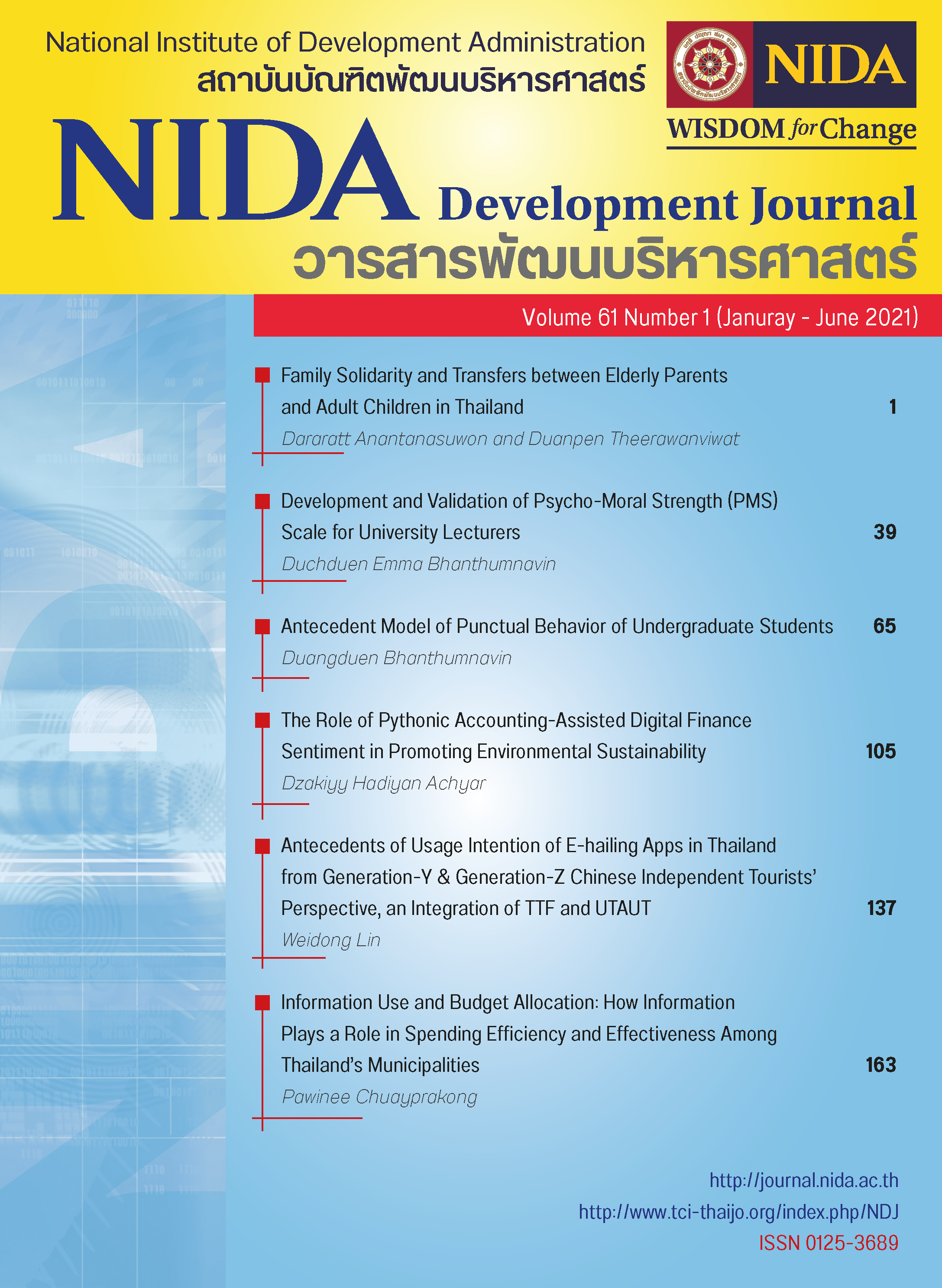Family Solidarity and Transfers between Elderly Parents and Adult Children in Thailand
Keywords:
Family Solidarity, Intergenerational Transfers, Older Persons , ThailandAbstract
The main purpose of the paper was to investigate the manifest family solidarity of older persons in Thailand related to structural solidarity, associational solidarity, and functional solidarity and to analyze the typology of support between elderly parents and their adult children using the Latent Class Analysis (LCA). The investigation and analyses of family solidarity and types of support were disaggregated by age groups comparing the young-old (aged between 60-69), the mid-old (aged between 70-79), and the oldest-old (aged 80 or over) The data from Wave 2 (2017) of the longitudinal panel household survey on Health, Aging, and Retirement in Thailand (HART) were employed for the cross-section analysis.
Results: The study findings of the three aspects of solidarity revealed that when parents were advanced in age, the solidarity in each aspect or the interrelationship with adult children would tend to increase, in terms of co-residence with children, frequency in contact with children, or the role of sole “recipients” of resource assistance from children. The solidarity indicators had higher share with the oldest-old parents compared with the young-old and the mid-old parents. It could be interpreted that with parents’ more advanced age, the status of self-reliance would change to reliance on others especially on children in terms of economic, social, and health aspects. With the physical and mental degradation, needs of assistance and care would increase.
The analysis of LCA revealed the four types of support between elderly parents and adult children in Thailand were “Detached” “Sociable” “Tight knit” and “Normative.” Each type had the shares of the elderly parents as follows: 41%, 6%, 29%, and 24%. In addition, the types of family relationship of elderly parents in each age group were different and could be evidence of a dynamic process of intergenerational interaction in the course of life. Overall, the study results pointed to the social norm that filial gratitude towards parents still existed in the Thai society. But behavior might change from the old pattern of children’s assistance and support both in cash and in kind to parents to at least in regular contact with parents or to parents exchanged assistance in kind. This changing behavior reflected the adaptation to the changing society, while familial support to older persons tended to become long-term care. As the older persons might relate to many generations of family members, to close the gap between generations should be a policy suggestion.
References
ปราโมทย์ ประสาทกุล และ ปัทมา ว่าพัฒนวงศ์ (2548) สถานการณ์ประชากรของประเทศไทย พ.ศ. 2548. ใน กฤตยา อาชวนิจกุล และ ปราโมทย์ ประสาทกุล (บรรณาธิการ), ประชากรและสังคม 2548 : ประชากรของประเทศไทย ณ พ.ศ. 2548. นครปฐม: สำนักพิมพ์ประชากรและสังคม.
สำนักงานคณะกรรมการพัฒนาเศรษฐกิจและสังคมแห่งชาติ (2558) ข้อมูลเศรษฐกิจและสังคม สถิติด้านประชากร จาก http://social.nesdb.go.th/SocialStat/StatSubDefault_Final.aspx?catid=1
Anantanasuwong, Dararatt, Dampen Theerawanviwat, Pachitjanut Siripanich, Preecha Vichitthamaros, Udomsak Seenprachawong, Ratiporn Tungfung, Arnond Sakworawich, Thongyai Iyavarakul, Tasanee Satimanon. (2018). Well-being of the Elderly in Thailand: Wave 2. Report No. 184017 to National Research Commission of Thailand. Bangkok, Thailand: Center for Aging Society Research, Research Center, National Institute of Development Administration (in Thai).
Bengtson, V.L. (2001). Beyond the nuclear family: The increasing importance of multigenerational bonds. Journal of Marriage and Family, 63, 1-16.
Bengtson, V.L. and Roberts, R.L. (1991). Intergenerational solidarity in aging families: An example of formal theory construction. Journal of Marriage and Family, 53, 856-870.
Knodel, J., Prachuabmoh, V. and Chayovan, N. (2013). The Changing Well-being of Thai Elderly: An Update from the 2011 Survey of Older Persons in Thailand. Report 13-793. University of Michigan, Institute for Social Research, Population Studies Center.
Knodel, J., Teerawichitchainan, Bussarawan, Prachuabmoh, V. and Pothisiri, Wiraporn. (2015). The Situation of Thailand’s Older Population: An Update based on the2014 Survey of Older Persons in Thailand. Report 15-847. University of Michigan, Institute for Social Research, Population Studies Center.
Lee, Ronald and Mason, Andrew. (2011). Population Aging and the Generational Economy: A Global Perspective. International Development Research Centre. Ottawa, Canada.
McChesney, K. Y., & Bengtson, V. L. (1988). Solidarity, integration, and cohesion in families: Concepts and theories. In D. J. Mangen, V. L. Bengtson, & P. H. Landry, Jr. (Eds.), Sage focus editions, Vol. 92. Measurement of intergenerational relations (pp. 15-30). Thousand Oaks, CA, US: Sage Publications, Inc.
Park, Keong-Suk, Phua, Voonchin, McNally, James, and Sun, Rongjun. (2005). Diversity and Structure of Intergenerational Relationships: Elderly Parent-Adult Child Relations in Korea. Journal Cross Cultural Gerontology.20:285-305.
Roberts, Robert E.L., Richards, Leslie, and Bengtson, Vern L. (1991). “Intergenerational Solidarity in Families: Untangling the ties That Bind.” Pp. 11-46. In Families: Intergenerational and Generational Connections. Susan P. Pfeifer and Marvin B. Sussman eds. New York: The Haworth Press.
Rossi, Alice S., and Peter H. Rossi (1990) Of Human Bonding: Parent-Child Relations Across the Life Course. Aldine de Gruyter. New York
Silverstein, M. and Bengtson, V.L. (1997). Intergenerational Solidarity and the Structure of Adult Child–Parent Relationships in American Families. American Journal of Sociology,103, No. 2, 429-460.
United Nations (2015). Transforming Our World: The 2030 Agenda for Sustainable Development. (A/RES/70/1). Resolution adopted by the General Assembly on 25 September 2015.
United Nations. (2017). Work of the Statistical Commission Pertaining to the 2030 Agenda for Sustainable Development (A/RES/71/313). Resolution adopted by the General Assembly on 6 July 2017.
https://en.wikipedia.org/wiki/Sustainable_Development_Goals#cite_note-:172-1
United Nations Development Programme. (2017). Ageing, Older Persons and the 2030 Agenda for Sustainable Development. New York, https://www.undp.org/publications/ageing-older-persons-and-2030-agenda-sustainable-development#modal-publication-download
Yi, Chin-chun and Lin, Ju-ping. (2009). Types of Relations between Adult Children and Elderly Parents in Taiwan: Mechanisms Accounting for Various Relational Types. Journal of Comparative Family Studies.40: 305-324.
World Health Organization. (2019). A Decade of Healthy Ageing 2020–2030. https://www.who.int/docs/default-source/decade-of-healthy-ageing/final-decade-proposal/decade-proposal-final-apr2020-en.pdf?sfvrsn=b4b75ebc_5
Zhao, Yaohui et. al. (2013). Challenges of Population Aging in China. Beijing: National School of Development, Peking University.
Downloads
Published
How to Cite
Issue
Section
License
Copyright (c) 2023 NIDA Development Journal

This work is licensed under a Creative Commons Attribution-NonCommercial-NoDerivatives 4.0 International License.





